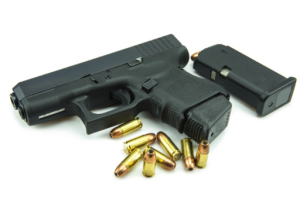“Negligent Discharge of a Firearm” │ California Penal Code 246.3 PC
In California, negligent discharge of a firearm is charged under Penal Code 246.3 making it unlawful to intentionally discharge a firearm with gross negligence which may result in death or injury to someone. This charge is considered a wobbler offense which means the government holds discretion when electing to file this charge as either a felony or misdemeanor. If arrested for a felony, your bail amount will be $25,000 unless you’re additionally charged with other offenses or enhancements. The following article will address 7 important things you should know about negligent discharge of a firearm.

Table of Contents
Negligent Discharge Article Overview:
1. Definition
2. Elements
3. Defenses
4. Punishment
5. Felony Reduction
6. Expungement
7. Contact Us
1. What is the Legal Definition for this Offense?
PC 246.3(a) provides, “Except as otherwise authorized by law, any person who willfully discharges a firearm in a grossly negligent manner which could result in injury or death to a person is guilty of a public offense…”
2. What Must the Prosecutor Prove for this Charge?
In order to prove you’re guilty of negligent discharge of a firearm under PC 246.3, the government holds the burden of proving each of the following elements beyond a reasonable doubt:
1. You intentionally shot a firearm;
2. You shot with gross negligence;
i. You acted in a reckless way that created a high risk of death of great bodily injury;
ii. A reasonable person would have known that acting in that way would create such a risk
3. The shooting could have resulted in the injury or death of another;
4. You were not acting in self-defense or defense of another.
3. What are the Legal Defenses for this Charge?
• You believed the firearm you discharged was not loaded. If this is true, then you lacked the requisite intent to discharge the firearm, and thus you cannot be guilty of this offense.
• You did not intend to discharge the firearm. Instead, you accidently discharged the firearm – e.g., the firearm discharged after it fell to the ground.
• You did not shoot with “gross negligent” conduct. In other words, a reasonable person would have discharged the firearm in the same way as you did.
• You were acted under self-defense or the defense of another from injury.
• Your incriminating statements were illegally obtained by police in violation of your Miranda rights.
• The firearm was illegally recovered in violation of your search & seizure right under the Fourth Amendment of the US Constitution.
• You’re being falsely accused by someone or you’re wrongly accused based on mistaken identification.
4. What is the Punishment for Negligently Discharging a Firearm?
The government can file charges under this offense as either a felony or a misdemeanor. If you’re convicted of a felony, you face 16 months, 2, or 3 years in the county jail. However, a misdemeanor conviction carries up to 1 year in the county jail.
5. Can I Reduce my Felony to a Misdemeanor?
If you were convicted of a felony and the judge granted you probation, then you may be eligible to reduce your conviction to a misdemeanor under PC 17(b) after successful completion of your probation period. If the court reduces your felony, then the offense will be a misdemeanor “for all purposes” relieving you from ever having to disclose that you’ve previously been convicted of a felony. Before ruling on your motion for reduction, the judge will consider the following factors:
• Your prior criminal record
• The severity of the circumstances of your case
• Whether you pose a threat to the community
• How you’ve changed since your conviction
• The reason(s) you’re seeking reduction – e.g., military, employment, etc.
• Whether you suffered any probation violations
6. Negligent Discharge Expungement
In California, an expungement petition is filed under PC 1203.4. If your petition is granted, then your conviction for Negligent Discharge of a Firearm will be dismissed in accordance with the expungement statute. To obtain this remedy, the judge must have sentenced you to probation. In other words, your conviction cannot have resulted in you serving time in state prison. Additionally, you must be fully completed with your probation period prior to filing your petition. If you suffer from any probation violations, your petition must be brought in the “interests of justice” giving the judge wide latitude to deny your expungement motion. For more information about expunging your criminal record, contact the Law Offices of John D. Rogers.
7. Free Criminal Defense Consultation
If you’ve been arrested or charged with negligent discharge of a firearm under PC 246.3, contact a Criminal Defense Attorney at the Law Offices of John D. Rogers to schedule a free confidential consultation concerning your rights and defenses.






